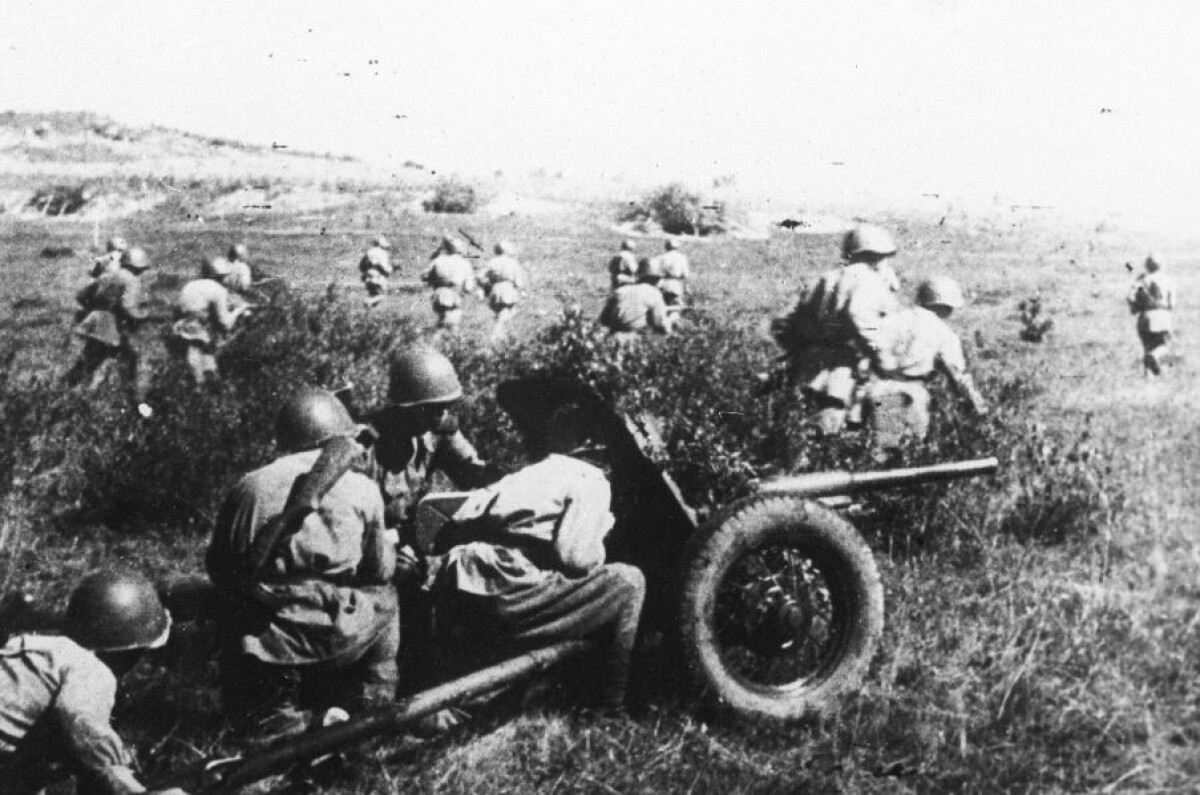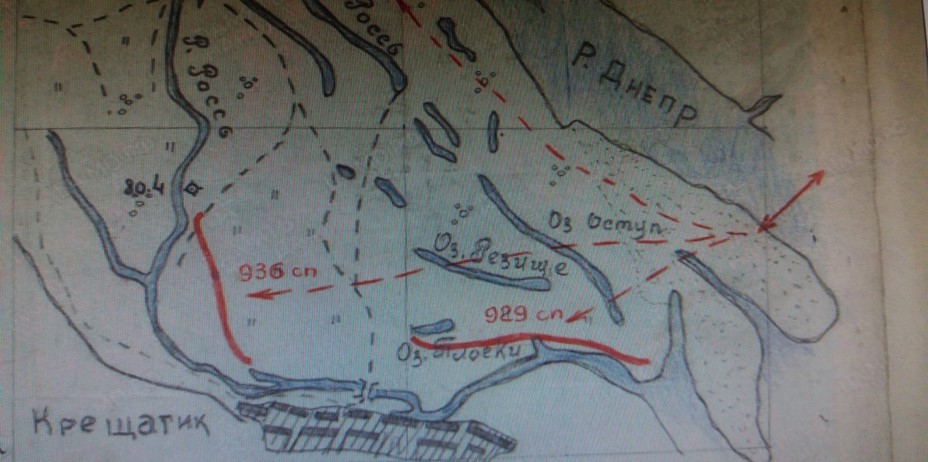
Kazakhstanis bravely fought on the front lines of the Great Patriotic War. The people of Kazakhstan remember and are proud of the brave patriots who showed valour and courage in fighting off the enemies. Zhakypbek Makhambetov was a national hero of Kazakhstan. In each battle, he displayed unusual courage and bravery, for which he was awarded the title of Hero of the Soviet Union. The leading researcher of the Institute of State History of NK MES RK, Ph.D. Kundyzay Yerimbetova told the Editorial Board of Qazaqstan Tarihy portal more about the heroic path of Zh. Makhambetov.
Zhakypbek Makhambetov was born on March 5, 1912 in the village of 9, in the Syr Darya district in the Kyzylorda region. From an early age, he tied his destiny to the land, farming all the time.
According to his contemporaries, the land became his home. At first he was an ordinary village man. Then, when agriculture began to be equipped with rich equipment and required mechanization personnel, Zhakypbek began to study the tractor and quickly mastered all the intricacies of the tractor profession.
From 1934 until 1942 he worked in the tractor brigade. He loved his business very much. The war caught him driving a car. In February of 1942, at the age of 30, the Syr Darya District Military Commissariat called him into the Red Army. Zhakypbek Makhambetov was a brave and skilful machine-gunner of the 933rd Rifle Regiment of the 254th Rifle Division of the 52nd Army of the Voronezh Front and participated in the fighting process. And in the difficult campaigns, he was always ahead in the heated battles with the opponent, showing his example to others. For exemplary performance of combat missions of command on the front Zh. Makhambetov was awarded the order “Red Star” and the medal “For Courage”.
He was a true patriot, a man who loved his country with all his heart. In a letter to the relative, he took an oath: “I had a good life at home. He sowed rice, sang the songs about happiness... Then, the war with the Germans began. I became evil. The fascists wanted to take my child, wife and mother away from me... I fell in love with the machine gun. From the "Maxim" of my comrade, I will leave only when the Germans are destroyed. I swear to you and relatives, that as long as eyes see and hands act, as long as at least one fascist soldier walks on our land, I will not leave the battlefield”. The fighting began for the Dnieper. At the beginning, he was dissatisfied, as he failed to get into the first boat sailing to the right bank of the Dnieper.
– “We will assign you a task, no less important”, – Lieutenant Rybakov told this the Junior Sergeant.
– You will stand here and secure the battalion.
Makhambetov was brightened at that moment.
—Thank you for your trust, Comrade Lieutenant. I don’t need a better job. I will help my friends swim through the Dnieper. This river is as dear to me as it is to my native Balkhash.
At night, the Red Army soldiers, who were just on barrels, floated on the Dnieper waves on fishing boats and rubber boats. The crossing line was under fire. The red strips of tracer bullets flew from the right bank, and German machine guns were fired there.
Makhambetov was calm. In the Kazakh steppe, he heard a wise rule from the old people: “When in the heart of a fire, there should be ice in the head”. The long queues of bullets from “Maxim” found the Germans on the right bank. When Makhambetov shot, the German machine guns were silenced immediately. Zorko guarded and secured the crossing of Zhakypbek. The battalion crossed the Dnieper without losses. It was the highest honor for the soldier’s skill of Junior Sergeant Makhambetov.
Sometime soon, the unit was ordered to expand the bridgehead and occupy the settlement. Taking advantage of the darkness, the fighters approached the village and broke into its streets at dawn. Makhambetov’s machine gun mowed the enemy like a spit of grass. The opponents gathered the large forces and began counterattacks against a small group of fighters remaining in the village. A battalion of Hitlerites marched against the eleven brave men, accompanied by four tanks.
– Makhambetov, fire! – demanded lieutenant Rybakov.
Then the short turn and suddenly the machine gun fell silent. Look for the damage, Zhabek (Zhakypbek), danger in your head. “The rupture of the casing was discovered to be the cause”. Makhambetov quickly eliminated the malfunction with dexterous, confident movements. And, he spoiled “Maxim” again. Seeing that a small group of Soviet fighters were acting against them, the enemy was getting more and more daring. Lieutenant Rybakov, Uzbek Red Army soldier Kerimov, and Makhambetov remained in the service. The junior sergeant, Makhambetov, had two anti-tank grenades and one RTD. The Lieutenant sent Zhabek to reconnoitre. The cornfield was attached to a large barn. Nearing it secretly, Zhabek heard the German voices. They were up to the company in the barn. The jigit leaned back and deftly threw an anti-tank grenade through the barn window. Many Hitlerites were killed in the barn. Zhabek scouted his men's path. He led his comrades. On the way, Makhambetov spotted a German cannon. A grenade was found for her by a brave man. Zhabek threw an anti-tank prize and the gun ceased to exist.
Zhabek noticed two women at one of the huts. The poor people were standing, shaking with fear.
– “Get me some water to drink!” – asked Zhabek.
The women stayed silent. And the tooth will not fall on the tooth. Our fighters moved back for the 15 meters.
– “Something went wrong here”, – thought Makhambetov.
– “Let's go back to the house”, – Zhabek said to his comrades as he boldly entered the hut. Seeing, two Krauts were hiding on the stove. Shortly after, Zhabek explained the purpose of his visit: he gave the Germans a queue from the vending machine.
Zhabek returned unharmed to his unit and brought a group of fighters with him. That’s how Zhabek Makhambetov crossed to the right bank of the Dnieper under the hurricane fire of the enemy in the division. Where the fierce attacked the enemy from the rear, 43 Fascists were killed by a machine gun and a grenade hit the German large caliber cannon on October 2, 1943.
On the night of October 17, 1943, in the battle for the village of Khreshchatyk, the fearless machine gunner Mahambetov, repelling a strong attack of the enemy, shot with his machine gun 44 assailants. An anti-tank grenade hit a German tank and three enemy vehicles. For his courage and heroism in crossing the Dnieper River and securing a bridgehead on the right bank of the Dnieper River, he received the title of Hero of the Soviet Union on October 29, 1943.

Архив ЦАМО. Ф. 408, Оп.0010011, Д.0140.
The leaders of the military-political units, admiring his feats on the battlefields, gave an assessment of the warrior and sent congratulations to the Kazakh people, the parents of the batyr. In particular, the deputy head of the political unit, captain G. Dectyarev, wrote the following things:
“The son of the sunny steppes of Kazakhstan, Zhakipbek Makhambetov, had come to the front since the beginning of the war. And from the first days of combat life, he showed his borderless devotion to his motherland and expressed his deep love for her. The entire staff of our unit sends heartfelt thanks and appreciation to the parents of Zhakipbek, who raised such a fearless batyr, and a big thanks to them from a pure soldier’s heart. We also ask all the workers of the Kyzyl-Orda region to write us letters that will inspire us to new feats in the war”.
Zhakypbek participated in all the battles as a machine gun scout in the 254th Rifle Division, 933rd Regiment of the 52nd Army in the Volkhov Front, the VGK Stavka reserve, Voronezh Front, and the 2nd Ukrainian Front.
In 1947, he was elected as a deputy of the Supreme Soviet of the Kazakh SSR. He had been living in Kyzylorda since 1955.
A unique but simple man went through the difficult journey of going from a tractor driver to a major public figure. The war did not prevent him from maintaining sincere human qualities. On the contrary, he was inspired and enjoyed his sweet taste. Perhaps this destiny is peculiar to those who put honour and conscience above all of this. Batyr of the Kazakh people died on October 19, 1981, but a page about his heroic spirit is written in the history of the Fatherland. Furthermore, the name of the hero will always remain in the memory of the people.
